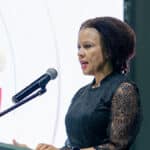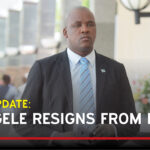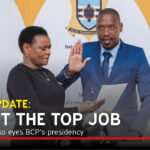Geophysicist reflects on 40 years in the industry
Closing in on 40 years in the world of Geophysics, there are few, if any, locals as experienced as Tiyapo Ngwisanyi when it comes to this complex field of natural science.
A journey that took off in a lecture room in Canada in the mid 1980s has eventually led to the boardroom of Kavango Minerals, where Ngwisanyi, 58, now serves as the Managing Director.
What an adventure the Maitengwe native has packed in between.
Firstly, congratulations on your recent appointment as Kavango Minerals MD.
Thank you very much. It is a great opportunity to be in a different part of the spectrum of the mineral industry.
Indeed, yours has been a long, distinguished career in this industry! Kindly sum it up for our readers?
As long as it is, summing it up is not that difficult as I have been working for the same employer all this time.
While doing a Pre-Entry Science Course in 1983 at the University of Botswana I was given sponsorship to go and study Geophysics in Canada.
I graduated with a B.Sc. in Applied Geophysics in 1988 and joined the Department of Geological Survey the same year.
My first position was Assistant Geophysicist and that entailed mostly geophysical data collection, processing and interpretation for groundwater and geological investigations.
That continued for several years and I rose through the ranks as my experience and responsibilities grew, until I became the Head of the Geophysics Division in 2003.
And that was just the start of your rise to the top.
In 2007, I was elevated to the position of Chief Geophysicist, responsible for the implementation of all mineral investigation projects in the department.
The story doesn’t end there because, as fortune would have it, I was appointed Director of the Department in 2010.
That was the highest position in the Department, responsible for the provision of overall leadership and management of the organisation as well as advising the ministry headquarters on geosciences in Botswana.
At the time, the Department was also responsible for the processing and management of Prospecting Licences.
In 2015 The Department of Geological Survey was replaced by Botswana Geoscience Institute (BGI) and I was appointed Chief Executive Officer of BGI.
I held the position until July 2021 when my contract came to an end.
Quite the journey! Has there been a particular highlight you can single out as your proudest moment?
Certainly there are several highlights. Being a geophysicist in Botswana is interesting on its own as there is a high need for the skill due to much of the geology of Botswana being covered by unconsolidated sediments related to the Kalahari Desert.
This, therefore, makes most of the country not amenable to traditional geological mapping.
I was privileged to understudy my Canadian supervisor who introduced the country-wide airborne magnetic survey of Botswana, a program that I later led and guided to completion.
As a result, Botswana has about 80 percent of her land area covered by detailed high resolution airborne magnetics.
In recognition of my contribution to this program, I was invited to be a panelist on airborne magnetics in Angola when that country was planning to introduce its own systematic airborne magnetic surveying.
Another highlight for me was the restoration of the Department of Geological Survey’s position in the international and regional sphere.
During my tenure as Chief Geophysicist, DGS signed a Memorandum of Agreement with Japan Oil, Gas and Metals National Corporation (JOGMEC) to establish a Remote Sensing Centre in Botswana.
This agreement started in 2008 and continues to date.
On the other end of the spectrum, what do you regard as your lowest point?
I became Director of the Department of Geological Survey when the organisation was experiencing a lot of misfortunes, ranging from diminished budgets to resignation of experienced staff.
As a result, projects, reports and publications dwindled.
The resignation of experienced geoscientists also meant that the quality of projects and services declined.
This was indeed a frustrating period when the customers and stakeholders began to question the organisation’s relevance.
I am, however, grateful that throughout this period of uncertainty I had a team of geoscientists and support staff who stayed the course until the Department was restructured to BGI.
I understand you played a key role in this restructuring process – must have been a stressful time?
Becoming the first CEO of BGI effectively meant winding down the affairs of DGS and coming up with a new organisation with a leaner structure.
It was a trying period because it was evident that a majority of the DGS employees would not make it to BGI.
It was a period of emotional turmoil for not only the staff but me as well.
On the human side, there was a lot of support from the restructuring team as all of us understood the reasons why the restructuring was necessary.
You served as CEO for six years, how do you look back on that time?
For me the assignment as CEO was quite clear, that is to form an organisation that would serve the needs of Batswana and Botswana in terms of providing relevant and updated geoscientific products and services and contributing to national economic growth and competitiveness.
This meant having the right structures, right people in terms of quantity and quality, right policies and the right budget.
It was not going to be easy considering that the organisation still had to compete for the national pie.
I am pleased to say that with the support I had from the BGI Management, staff and the Board, I built an organisation with a clear scientific vision guided by a modern strategic plan. My tenure as CEO saw the image and recognition of BGI as a geoscience centre for information and research, both at national and international level, enhanced.
I have no doubt in my mind that the team I left behind has the zeal and zest to continue the international collaborations we have established.
And now to Kavango Minerals, what is the company’s mandate?
Kavango Minerals is a Botswana registered company that is wholly owned by Kavango Resources PLC, a company registered in the UK.
Kavango Minerals’ mandate is to prospect and discover base and precious metals in Botswana.
What projects is the company currently undertaking?
The Company’s areas of focus currently are the exploration for Copper-Nickel-Platinum Group Mineral (PGM) rich sulphide ore bodies in the Kalahari Suture Zone (KSZ) and copper-silver deposits in the Kalahari Copper Belt (KCB).
The KSZ is a north-south trending 450km long magnetic anomaly in the southwest of the country, along which Kavango has 16 prospecting licences.
The KCB is a belt approximately 1, 000km long and 250km wide that stretches from northeast Botswana to western Namibia.
Kavango operates 12 prospecting licences in the KCB, 10 of them being joint ventures with Power Metal Resources and LVR GeoExplorers.
And what stage are these projects at?
Kavango has done extensive work in the projects, including detailed geological mapping, geochemical sampling, and airborne and ground geophysics.
As the KSZ is covered by thick sediments, the company has had to apply and rely on modern exploration techniques to the area.
In mid-2021 Kavango started a diamond drilling program in the KSZ and its 4th borehole is on-going at the moment.
Going forward, any other projects in the pipeline?
Definitely.
Kavango’s intention is to make world-class base and precious metal discoveries in Botswana.
To do this, the company is always on the lookout for new opportunities.
The latest project in the portfolio is the Molopo Farms Complex which is also highly prospective for nickel, copper, and PGMs.
In November 2021, Kavango entered into an agreement with Kalahari Key Mineral Exploration (KKME) to obtain shares in the MFC project.
And on a personal note, how do spend the little free time you get away from work?
When I am not thinking or doing mineral exploration related work I dabble in small scale farming or studying metaphysics.
PERSONAL PROFILE
Full names: Tiyapo Hudson Ngwisanyi
Place of Birth: Maitengwe
Date of Birth: 7 November 1963
Mentors: David Ngwisanyi Matoko (MHSRIP), Dr. Ron T. Chaoka and Neville Goddard.
Dream holiday destination: Madagascar
Car driving: Nissan Navara 2010 model
Favourite food: Zengwe and mutton
Favourite drink: Orange juice, red wine
What makes you angry: Not taking care of the little things















